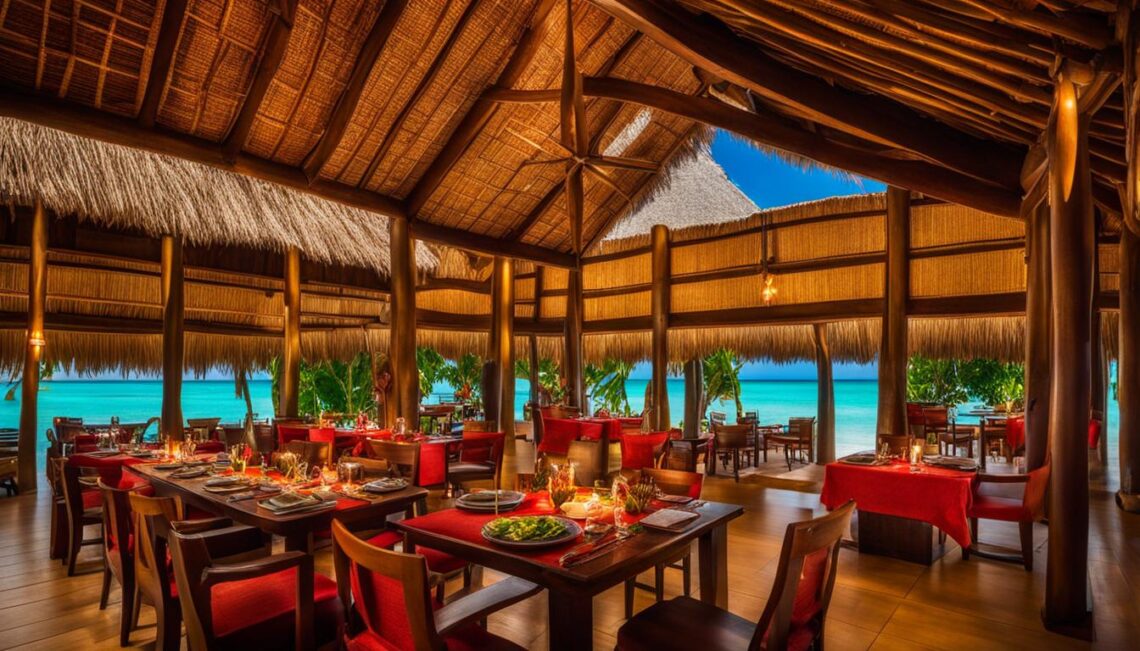The Maldives, a stunning archipelago in South Asia, is not only famous for its turquoise waters, white sandy beaches, exotic marine life, and picturesque islands but also its incredible cuisine. Maldivian food culture is a unique blend of indigenous dishes influenced by Indian, Arab, and Sri Lankan culinary traditions. Therefore, exploring the Maldives through its food is an excellent way to experience its rich culture and flavors.
From traditional Maldivian dishes with authentic flavors to the diverse range of seafood delicacies, the Maldives offers food experiences that will delight any food lover. The country is a paradise for sea-food lovers because of the abundance of marine life in its surrounding waters.
Key Takeaways
- The Maldives’ food culture is an integral part of its overall culture and should not be missed by visitors.
- The Maldives’ unique blend of indigenous dishes influenced by Indian and Arab culinary traditions has led to several distinctive flavors and spices.
- The Maldives is a seafood lover’s paradise because of the abundance of seafood in its surrounding waters.
- Exploring the local ingredients used in Maldivian cuisine and visiting bustling local markets can be a unique way to experience the Maldives.
- The Maldives’ sustainable food practices make it an eco-friendly culinary destination.
Traditional Maldivian Dishes
Maldivian cuisine is full of flavors that are both unique and authentic. The traditional dishes offer a range of experiences that showcase the country’s rich culinary heritage. From fresh seafood to coconut-based dishes, Maldivian cuisine is sure to satisfy any culinary enthusiast.
Mas huni, a beloved breakfast dish, combines shredded smoked tuna, grated coconut, onions, and chili peppers. Chefs typically serve it with roshi, a type of flatbread.
Garudhiya, another crowd-pleaser, is a fish soup crafted from freshly caught fish, chili peppers, and spices. Cooks boil it until it’s rich in flavor and then serve it over rice.
Fihunu mas features grilled fish marinated in chili and spices. To balance its spicy flavor, people often add it to mas huni or pair it with rice.
For dessert, the traditional Maldivian bulhaa, a sweet coconut cake, delights those who try it. Made from grated coconut, rice flour, and sugar, it’s a must-try for anyone visiting the Maldives.
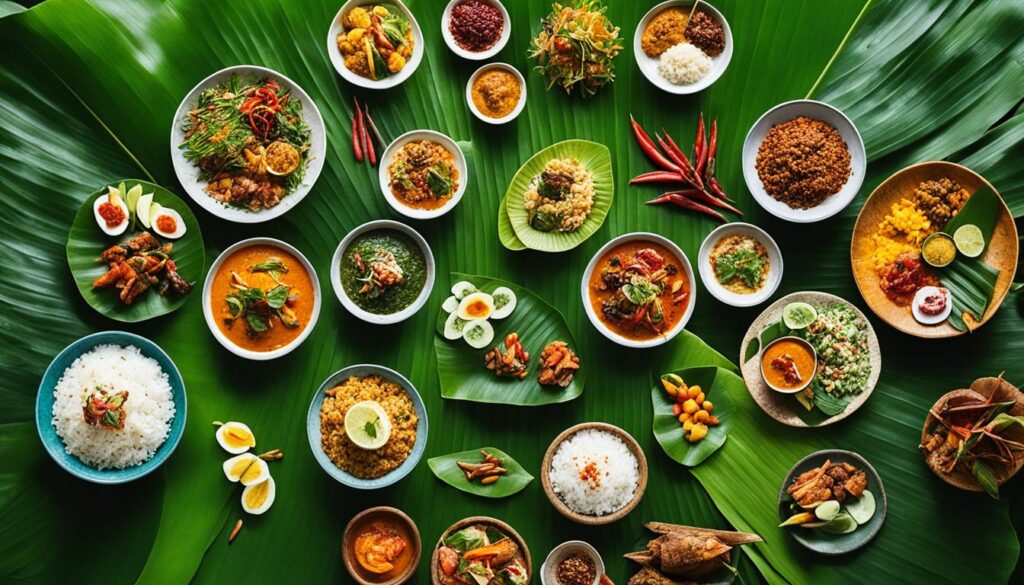
These are just some of the many traditional Maldivian dishes that offer an insight into the country’s rich culinary history. Visitors to the Maldives can indulge in these authentic flavors for a truly unique and unforgettable culinary experience.
Local Ingredients in Maldivian Cuisine
Maldivian cuisine is a unique blend of flavors and ingredients that reflect the tropical paradise in which it is found. The Maldives is teeming with an abundance of fresh seafood, exotic fruits, and coconut-based products which are the backbone of this island nation’s culinary scene.
Seafood is a staple in Maldivian cuisine and features prominently in the country’s traditional dishes. Tuna, crab, squid, and lobster are just some of the seafood delights that visitors can expect to find in Maldives.
Tropical fruits like mangoes, papayas, and guavas are used widely in Maldivian cuisine, bringing a sweet and refreshing flavor to dishes.
Coconut milk is another prominent ingredient in Maldivian cuisine. It is used in curries, sauces, and desserts, providing a rich and creamy flavor to dishes.
Overall, the use of local ingredients in Maldivian cuisine lends a unique and authentic flavor to the dishes, making it an unforgettable culinary experience for visitors to the Maldives.
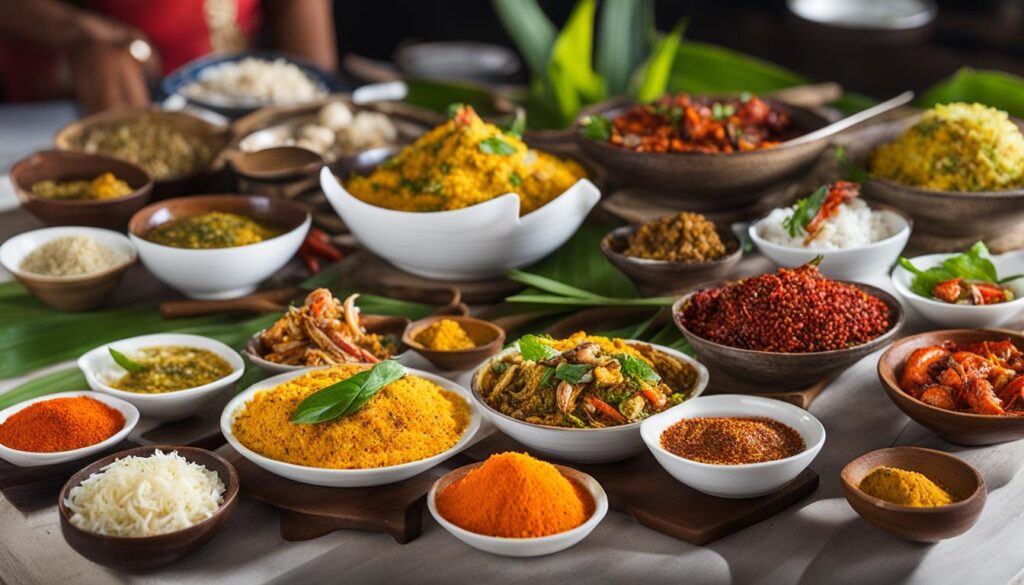
The Influence of Indian and Arab Cuisine
Maldivian cuisine has been significantly influenced by neighboring Indian and Arab culinary traditions, shaping its unique flavors and spices. Additionally, the Maldives’ strategic location at the crossroads of Indian Ocean trade routes facilitated the influx of spices, herbs, and cooking techniques from these regions, which have become integral to the local cuisine over the centuries.
Moreover, the Arab influence on Maldivian cuisine is evident in dishes like mas huni, a breakfast delicacy made of shredded smoked tuna, coconut, and onion, inspired by the Arabian dish foul medames. Similarly, garudhiya, a traditional Maldivian fish soup and a staple in local households, shares similarities with Middle Eastern fish soups and stews.
Furthermore, Indian flavors significantly enrich Maldivian cuisine, with ingredients like curry leaves, cumin, and turmeric playing a central role. Spices such as cardamom, cinnamon, and cloves deepen the flavors of many Maldivian dishes. For example, the creation of Shan Veenas (sandwiches) with flatbread, spicy tuna, and vegetables draws inspiration from Indian street food, highlighting the profound culinary connections between these cultures.
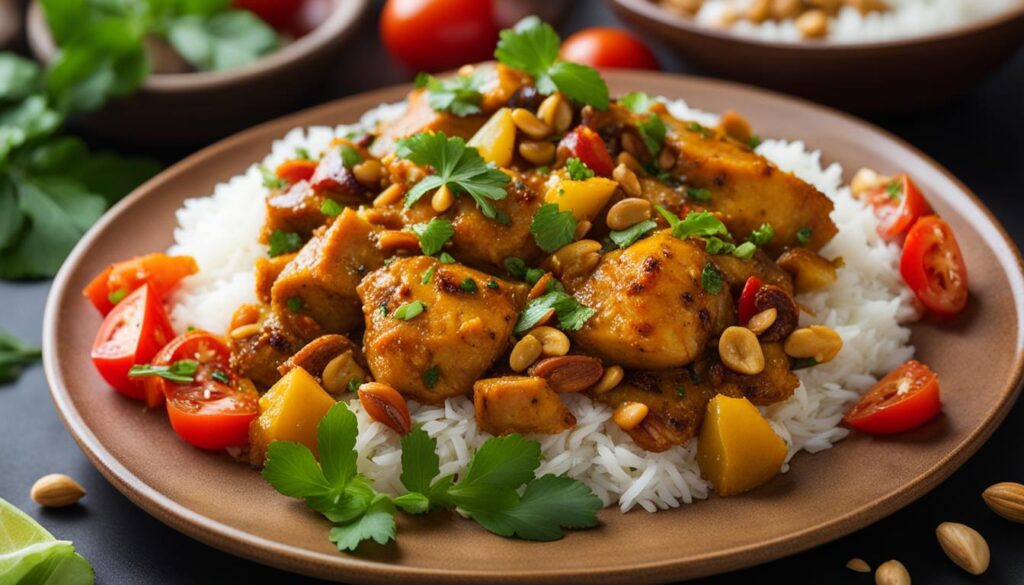
The fusion of Indian and Arab flavors with local ingredients and cooking techniques has resulted in the creation of unique and authentic Maldivian dishes that are a must-try for any food lover visiting the Maldives.
Street Food and Local Markets in the Maldives
Exploring the local food scene is a must-do for any foodie visiting the Maldives. The bustling local markets and vibrant street food scene offer an authentic taste of Maldivian cuisine and its diverse flavors. Visitors can sample a range of traditional dishes, such as masroshi, a pastry filled with spiced fish, coconut and onion, or keemia, a deep-fried snack filled with spiced fish or chicken.
One of the best places to experience the local food culture is at the Male Local Market. Here, visitors can find a variety of fresh seafood, tropical fruits, and other locally sourced ingredients that are essential to Maldivian cuisine. Another popular spot is the Hulhumale’ Fish Market, where visitors can witness the daily catch being sold and even sample freshly grilled fish on site.
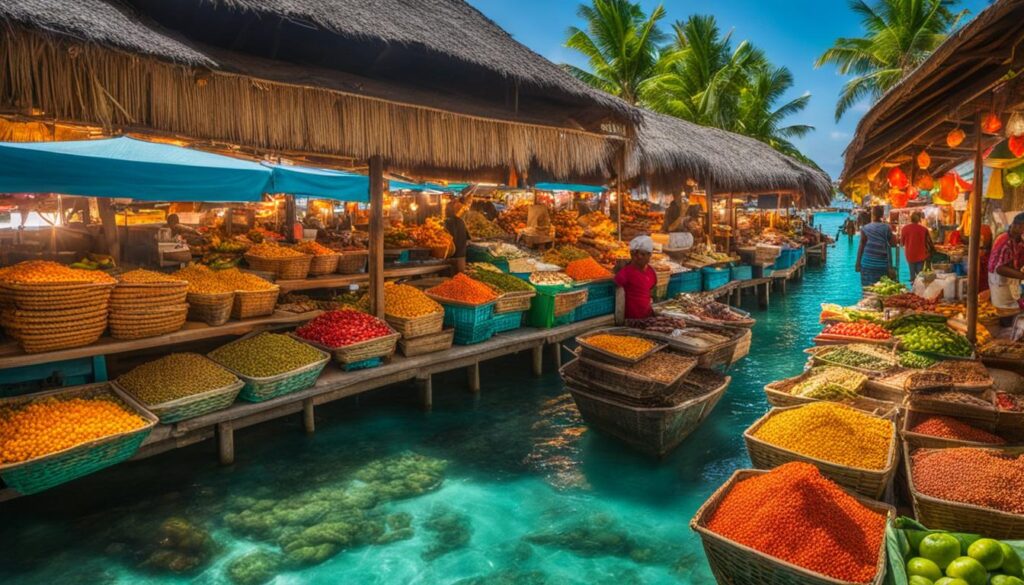
For those interested in trying out the street food scene, head to the Artificial Beach, which hosts a lively food market with a variety of food stalls. Here, visitors can try local favorites like roshi, a flatbread that is perfect for sopping up curries, or hedhikaa, a variety of deep-fried snacks.
The Maldives food culture offers a unique experience that is not to be missed. Visitors can indulge in the vibrant culinary scene, sample local flavors and enjoy the lively atmosphere of the street food scene and local markets.
Dining Experiences in Luxury Resorts
When it comes to dining experiences, luxury resorts in the Maldives offer an exceptional culinary adventure. Visitors can indulge in authentic Maldivian cuisine, international dishes, and everything in between. With stunning views of the Indian Ocean and impeccable service, dining in a resort is an unforgettable experience.
From romantic beach dinners to private picnics on a secluded island, the Maldives offers unique dining experiences that cater to various preferences. Moreover, guests can savor traditional dishes made with locally sourced ingredients, providing a true taste of Maldivian food culture.
Additionally, many resorts host cooking classes, giving you the opportunity to learn the secrets of Maldivian cooking from the experts themselves. Furthermore, with world-class chefs and an array of dining options, dining in a luxury resort becomes a must-try experience for any foodie visiting the Maldives. Consequently, these culinary adventures not only satisfy your taste buds but also enrich your understanding of the local cuisine and culture.
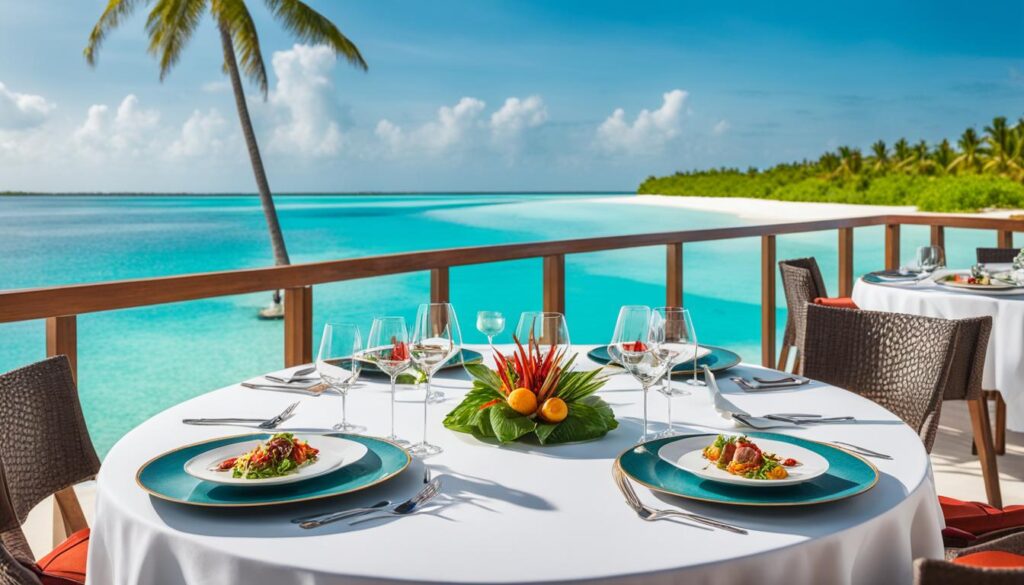
Fine Dining Restaurants
Maldives has a variety of fine dining restaurants within its luxury resorts. The chefs carefully craft each dish, using the freshest ingredients to create culinary delights that are both flavorful and visually stunning.
| Restaurant Name | Type of Cuisine | Resort Name |
|---|---|---|
| The Whale Bar | Japanese and Peruvian fusion | Waldorf Astoria Maldives Ithaafushi |
| Ufaa by Jereme Leung | Chinese | The Ritz-Carlton Maldives, Fari Islands |
| The Lighthouse Restaurant | Mediterranean and European | Coco Bodu Hithi |
These fine dining restaurants offer an impressive selection of wines and other beverages to complement the meal perfectly. Guests can enjoy their culinary experience while watching the sunset or listening to live music.
Seafood Delights in the Maldives
The Maldives, an oceanic paradise, offers rich marine life and abundant seafood. Visitors enjoy fresh, flavorful seafood dishes, from lobster to crab, showcasing Maldivian flavors. Options include seafood curries, grilled fillets with coconut chutney, Maldivian tuna rolls, and fresh sashimi. Seafood is central to Maldivian cuisine, available from beach barbecues to luxury resorts, a must-try for food enthusiasts.
Traditional Drinks and Beverages
Inviting, tropical beverages are an essential part of the Maldivian culinary culture. To experience the local flavor fully, try the refreshing coconut-based drinks, including the all-time favorite “kurumba.” The Maldives is known for its unique tea offerings, including black tea with a hint of ginger and cardamom, as well as herbal infusions. The locally grown fruits are used extensively to make delicious smoothies and juices.
It’s impossible to experience Maldivian cuisine without sampling traditional drinks and beverages that complement the local dishes perfectly.
“You can’t visit the Maldives and not try the coconut water. It’s refreshing and full of nutrients, perfect for a hot day at the beach.” – A satisfied tourist
Cooking Classes and Food Tours in the Maldives
If you’re a food enthusiast eager for a deep-dive into culinary arts, Maldives welcomes you with open arms. Dive into hands-on cooking classes and food tours led by experts, unveiling the rich flavors of Maldivian cuisine. These unique experiences offer a chance to master local cooking methods and delve into the lively food culture of the Maldives.
Uncover the art of crafting traditional Maldivian dishes like Garudhiya (fish soup), Mas Huni (smashed tuna salad), and Keemia (spiced fish roll), using fresh, locally sourced ingredients found in the markets. You’ll also get to explore the diverse seafood offerings and learn the traditional Maldivian ways of preparing them.
Numerous resorts in the Maldives conduct cooking classes, enabling you to polish your cooking skills and enjoy the fruits of your labor. Additionally, food tours come highly recommended for those eager to wander through local markets, engage with vendors, and sample exquisite Maldivian delicacies. Furthermore, indulging in these culinary senses through cooking classes and food tours presents a splendid opportunity to immerse yourself in Maldivian food culture. Consequently, embarking on this memorable gastronomic journey allows you to deeply connect with the local traditions and flavors.
Table of Local Maldivian Dishes learned in Cooking Classes
| Dishes | Description |
|---|---|
| Garudhiya | A light fish broth made with fresh tuna, lime, and chili |
| Mas Huni | A breakfast dish made with smoked tuna, coconut, onion, and chili |
| Kulhi Boakibaa | Tuna cake made with grated coconut, onion, chili, and spices |
| Bis Keemiya | A crispy pastry filled with spiced fish and onions |
| Huni Roshi | A popular snack made of flatbread stuffed with smoked tuna, chili, and onion |
Table of Local Maldivian Dishes learned in Cooking Classes
Flavorsome and authentic, these dishes are a must-try for any food lover visiting the Maldives. Join a cooking class, learn to make these local delicacies, and bring the taste of the Maldives back home.
Sustainable Food Practices in the Maldives
The Maldives is famous for beautiful beaches and diverse cuisine. It’s now focusing on sustainable food practices to protect its natural resources and promote its unique food culture.
One way the Maldives manages to retain its eco-friendly reputation through food production is by prioritizing locally sourced ingredients. The use of local ingredients aims to reduce the carbon footprint of imported foods, while also supporting local farmers and businesses. By doing so, visitors can enjoy the bounty of the ocean and islands while also understanding the culture and the stories that come with each dish.
Eco-friendly fishing practices also play a significant role in Maldivian cuisine, ensuring the sustainability of seafood for future generations. Authorities methodically monitor and control fishing efforts to avoid depleting resources, thereby preserving the fisheries of the Maldives for future generations. This approach is a vital part of the food culture in the Maldives.
The Maldives is continually looking for ways to reduce food waste, which is essential for sustainability. With this in mind, most resorts opt for a la carte menus or smaller buffets to avoid excess food wastage. Restaurants serve their meals with artistic flair without compromising on quality or taste, and the food is both nutrient-dense and promotes local delicacies. This food sustainability commitment helps to mitigate food waste and reduce carbon emissions, ensuring that the Maldives remains a dream destination for eco-conscious travelers.
Summary
The Maldives values preserving natural resources, adopting sustainable food practices and eco-friendly techniques. Maldivian cuisine reflects these sustainable values. Travelers enjoy local dishes with beautiful views, assured their dining is environmentally ethical.
International Cuisine in the Maldives
Maldivian cuisine shines in gastronomic tourism, but the Maldives also offers diverse international foods. Guests can enjoy Italian at L’acqua or Japanese at Sake Bar & Restaurant, with stunning Indian Ocean views.
Other international flavors available across the island nation include French, Mediterranean, Thai, and Chinese cuisine. In resorts across the Maldives, skilled chefs use local produce and fresh ingredients to create a wide range of international dishes that cater to the diverse tastes of visitors from around the world.
Whether visitors crave a taste of home or desire to explore new culinary horizons, international cuisine options in the Maldives are sure to deliver a memorable dining experience.
Conclusion
Embarking on a culinary adventure in the Maldives offers an unparalleled experience. Firstly, visitors can delve into a wide array of flavors, from traditional Maldivian dishes to global cuisines, providing a window into the local culture, traditions, and history.
Furthermore, the vibrant Maldivian food culture, central to the island’s identity, emphasizes local ingredients, sustainability, and traditional cooking methods. Consequently, visitors have the opportunity to immerse themselves in this rich culture through cooking classes, food tours, or by exploring local markets and street food areas.
Moreover, whether opting for dining in luxury resorts or sampling street food, visitors can savor a variety of Maldivian gastronomical experiences. Thus, the Maldives food journey promises to leave visitors with lasting memories, establishing it as a must-visit for any food enthusiast or traveler.
Therefore, what are you waiting for? Begin your exploration of the Maldives through its food and immerse yourself in the rich Maldivian food culture for a truly authentic and memorable experience.
Happy travels and happy eating!
LOOKING FOR MORE?
- Italian Restaurants in the Maldives: Recommendations for the Best Dining Experience
- Ways to Save Money in the Maldives
- A Guide to Choosing the Best Overwater Bungalows in the Maldives
FAQ
What is Maldivian cuisine?
Maldivian cuisine is the traditional food culture of the Maldives, a tropical island nation in the Indian Ocean. It is influenced by the rich flavors of Indian and Arab cuisines, with an emphasis on seafood, coconut, tropical fruits, and aromatic spices.
What are some traditional Maldivian dishes?
Traditional Maldivian dishes include Garudhiya (fish soup), Mas Huni (tuna and coconut salad), Rihaakuru (fish paste), and Fihunumas (spicy fish curry). These dishes showcase the authentic flavors and cooking techniques of Maldivian cuisine.
What are the local ingredients used in Maldivian cuisine?
Maldivian cuisine utilizes an array of local ingredients, including freshly caught seafood such as tuna, reef fish, and crab. Coconut is also a staple ingredient, used in various forms such as coconut milk and grated coconut. Tropical fruits like bananas, mangoes, and pineapples add a refreshing touch to many dishes.
How has Indian and Arab cuisine influenced Maldivian food?
Indian and Arab culinary traditions have influenced Maldivian cuisine through the introduction of spices, flavors, and cooking techniques. Indian spices like cumin, coriander, and turmeric are commonly used, while Arab influences can be seen in dishes like roshi (unleavened bread) and biryani (spiced rice).
What can I expect from the street food and local markets in the Maldives?
The Maldives offers a vibrant street food scene and bustling local markets where you can sample a variety of delicious treats. From savory snacks like hedhika (deep-fried snacks) to sweet treats like bondi (sweetened rice balls), there is something to satisfy every palate.
What dining experiences can I find in luxury resorts in the Maldives?
Luxury resorts in the Maldives offer exceptional dining experiences, including fine dining restaurants with international cuisines, private beach picnics, and romantic dinners under the stars. These experiences allow you to indulge in exquisite flavors while enjoying the breathtaking surroundings of the Maldivian islands.
What seafood delicacies should I try in the Maldives?
The Maldives is known for its bountiful seafood offerings. Some must-try seafood delicacies include grilled fresh fish, lobster thermidor, and crab curry. These dishes highlight the freshness and quality of the seafood available in the Maldives.
What are some traditional drinks and beverages in the Maldives?
Traditional drinks and beverages in the Maldives include refreshing coconut-based drinks like kurumba (young coconut water) and raa (coconut sap), as well as herbal infusions such as sai (lemongrass tea). These beverages complement the flavors of Maldivian cuisine.
Are there cooking classes and food tours available in the Maldives?
Yes, there are cooking classes and food tours available in the Maldives. These experiences allow you to learn about Maldivian cooking techniques, explore local markets, and immerse yourself in the vibrant food culture of the Maldives.
How does the Maldives promote sustainable food practices?
The Maldives promotes sustainable food practices by prioritizing locally sourced ingredients, supporting eco-friendly fishing practices, and reducing food waste. By embracing these practices, the Maldives aims to preserve its natural resources and promote a more sustainable culinary scene.
Can I find international cuisine options in the Maldives?
Yes, the Maldives offers a wide range of international cuisine options. From Italian and Japanese to Indian and Middle Eastern, you can explore a diverse array of global flavors while enjoying the breathtaking beauty of the Maldives.
What can I expect from exploring the Maldives through food?
Exploring the Maldives through food allows you to discover the unique flavors, traditional dishes, and cultural significance of Maldivian cuisine. It offers a culinary journey that immerses you in the vibrant food culture of this tropical paradise.

